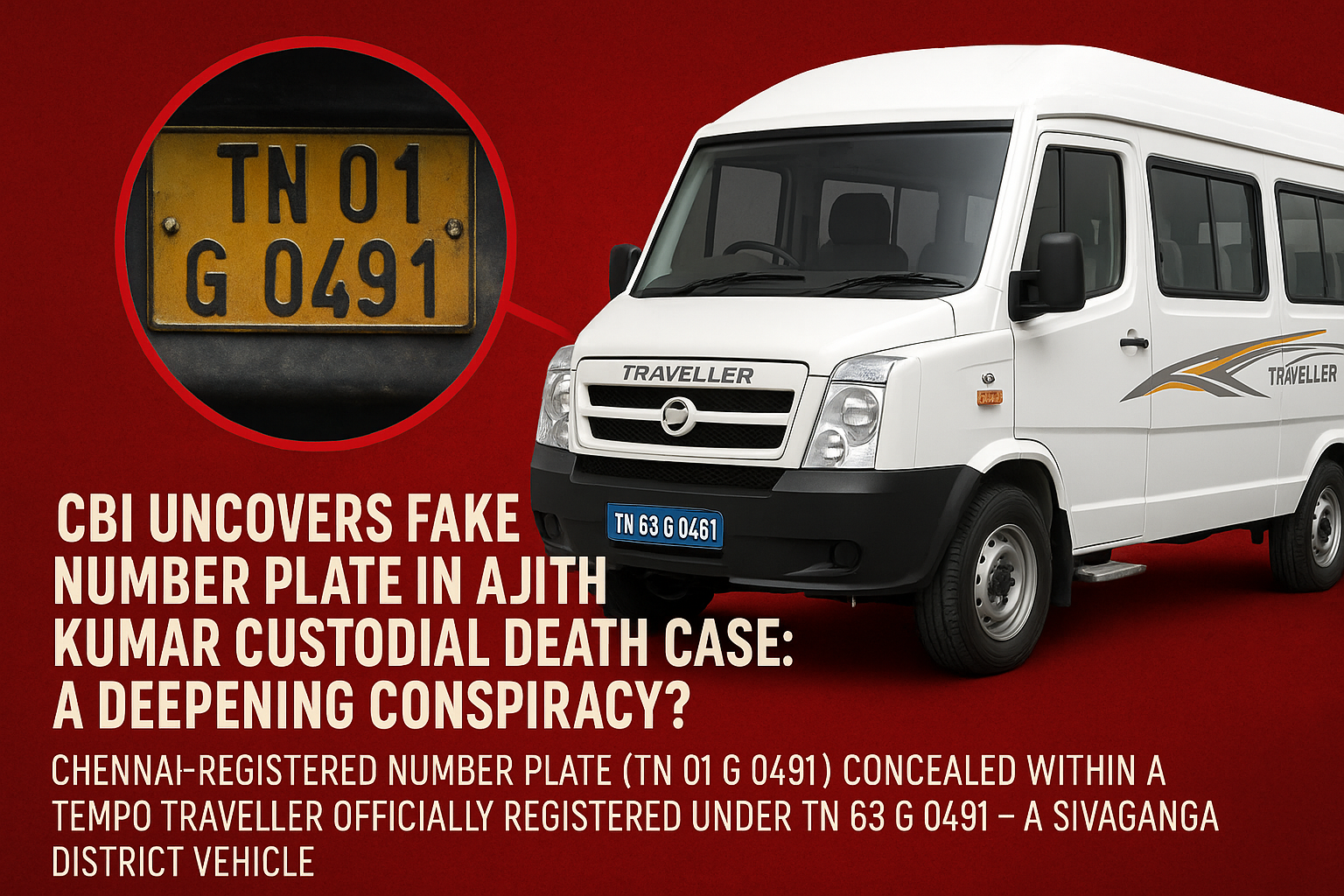In a horrifying incident from Tamil Nadu, a 25-year-old temple security guard named Ajith Kumar died after being brutally tortured by the police during interrogation.
The case has sparked massive outrage across India, with the Madras High Court calling it "murder in the name of investigation." Five policemen have been arrested, and the case has been handed over to the CB-CID for a fair probe. Here’s a complete breakdown of what happened.
Victim and Initial Incident:
- Ajith Kumar, a contract security guard at Bathrakaliyamman temple in Thiruppuvanam, Sivaganga district.
- Taken for questioning by Manamadurai Crime Branch special team regarding a 10-sovereign gold theft from a devotee's car (Friday).
- Died during interrogation on Saturday, sparking widespread outrage.
Initial Police Action & Public Response:
- District SP Ashish Rawat suspended six police personnel.
- Political parties condemned suspensions, demanding justice beyond mere suspension.
Case Escalation:
- Post-mortem report received, leading to the case being converted to a murder case.
- Tamil Nadu government transferred the investigation to CB-CID.
Arrests and Remand:
- Five suspended policemen arrested: Prabhu, Kannan, Sankara Manikandan, Raja, and Anandan.
- All five remanded to 15 days of judicial custody in Madurai Central Prison.
- Families of arrested policemen protested.
SP Transfer:
- Sivaganga District SP Ashish Rawat transferred to compulsory waitlist.
- Ramnad District SP Sandeesh given additional charge of Sivaganga.
Madras High Court (Madurai Bench) Proceedings (First Session):
- Heard petitions seeking murder case registration.
- Judges' Strong Criticism: Severely criticized Tamil Nadu government and police.
Petitioner's Arguments:
- Police fabricated a story of Ajith dying from a seizure.
- Police allegedly offered ₹50 lakh to Ajith's family to support the seizure claim.
- An IAS officer allegedly pressured police in the case.
- Submitted a video showing police assaulting Ajith behind the temple, taken from a window.
Judges' Questions to Police:
- Who is the IAS officer who exerted pressure?
- Why was Ajith not interrogated at the police station? Why were he interrogated in outside locations?
- Who authorized taking him to different locations for interrogation?
- Reason for immediate transfer of Sivaganga SP?
CCTV Allegations & Orders:
- Petitioner alleged police removed CCTV footage.
- Judges questioned if police wanted to conceal evidence to impede investigation.
- Ordered surrender of all seized CCTVs.
Judges' Further Remarks:
- "Why do the police need to beat people?"
- "The police are refusing to tell the full truth."
- Ordered DGP to respond on who ordered the special team's investigation.
- "You took him away under the guise of investigation and murdered him."
- Chastised government: "State should take responsibility for Ajith Kumar's death."
- Warned of ordering a judicial inquiry headed by a District Judge.
- Adjourned hearing to the afternoon.
Video Evidence:
- A video showing the special team assaulting Ajith Kumar behind the Madapuram temple went viral.
Madras High Court (Madurai Bench) Proceedings (Second Session - Afternoon):
- Madurai Government Rajaji Hospital Dean Arul Sundaresh Kumar submitted Ajith Kumar's post-mortem report.
Judges' Even Harsher Condemnation:
- "This is not a simple murder case. Ajith Kumar was beaten to death."
- "There are 44 injuries on his body. The post-mortem report is shocking."
- "The police did not spare any organ in his body."
- "The police, in their arrogance of power, brutally assaulted Ajith."
- "The state has murdered its own citizen."
CCTV Revelations:
- Judges asked about temple CCTV footage.
- Temple assistant testified SI Ramachandran took the footage.
- Judges lamented destruction of evidence.
Further Questions & Testimony:
- Why were bloodstains not collected from the assault spot?
- Person who video-recorded the assault testified from the restroom behind the temple.
Government Assurances:
- Assured strict action, including against higher officials.
Judges' Remarks on Policing & Society:
- No police should act this way in future.
- Such incidents are dangerous in an educated state like Tamil Nadu.
Political Blame Game:
- Government accused opposition of politicizing.
- Judges retorted: "If you were in the opposition, you would do the same."
Comparisons & Specifics:
- Recalled Sathankulam Jayaraj and Beniks case.
- Mentioned chili powder was put in Ajith Kumar's genitals, mouth, and ears.
FIR & Compensation:
- FIR not registered on Ajith's mother's complaint yet.
- Judges chastised police for attempting to negotiate ₹50 lakh compensation instead of registering FIR.
- Ordered government to conduct a fair investigation.
CBI Transfer:
- Government indicated no objection to transferring case to CBI.
Post-Mortem Findings Reiteration:
- Post-mortem report clearly shows Ajith Kumar died from brutal assault.
Preventative Measures:
- Judges questioned what steps are being taken to prevent further custodial deaths.
Evidence Preservation & Judicial Inquiry:
- Ordered preservation of all CCTV footage (police station and temple) without alteration.
- Ordered Madurai District Judge John Sundarlal Suresh to investigate the case (referred to as a "judicial inquiry").
- Ordered Thiruppuvanam Inspector, Sivaganga SP, and investigating officer to provide all case documents to the inquiry judge.
Current Situation:
- The entire nation is closely watching the developments in this case following the judges' strong criticisms.
India | Tamilnadu | Sivagangai






